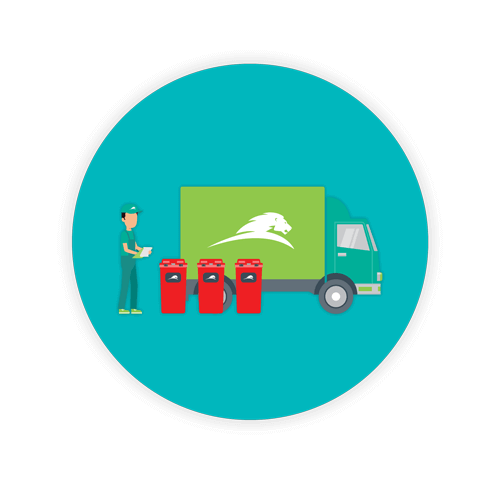Importance of Infectious Waste Training

Are you certified to handle, package, and sign pickup manifests for infectious waste? If not and you've signed a manifest, you may have inadvertently put your facility at risk for a fine. All healthcare employees handling, packaging, or signing off on healthcare waste pickups should have their certification to do so per the Department of Transportation. Learn more in this blog.
Proper infectious waste training is essential to not only protect yourself, but co-workers, healthcare waste companies, and the environment.
Did you know that the Department of Transportation (DOT) issues the responsibility of proper training in the handling of infectious waste to the shipper? ‘Shipper’ does not imply the healthcare waste company you partner with to transport your waste, but also to your facility. You are the "shipper", the cradle-to-grave responsibility for any waste generated lies with you.
It doesn’t matter whether you’re hospital, an outpatient clinic, a plastic or cosmetic surgical center, the local veterinary office, or an independent dental practice. If you produce potentially hazardous, infectious, or biohazard waste, it’s your responsibility to ensure that it is segregated, packaged, stored, and labeled – and transported - correctly.
TOPICS WE WILL COVER:
1 / Proper infectious waste trainig is not to be underestimated
2 / Remember, medical waste regulations vary state by state. What does your state say?
3 / Infectious waste training essential for safety
Proper infectious waste training is not to be underestimated
When it comes to medical waste disposal, the federal government takes the packaging and transportation of biohazardous waste, and most especially infectious waste, seriously. It is the shipper’s responsibility (such as the hospital) to properly train each and every employee involved in infectious waste segregation management. Wait, where are these rules? Check out CFR 49 – Transportation.
Failure to adhere to section 173.22 of CFR 49 may result in severe penalties for non-compliance. Read this definition in regard to a shipper’s responsibility:
“Except as otherwise provided in this part, a person may offer a hazardous material for transportation in a packaging or container required by this part only in accordance with the following:
1. The person shall class and describe the hazardous material in accordance with Parts 172 and 173 of this subchapter, and
2. The person shall determine that the packaging or container is an authorized packaging, including Part 173 requirements, and that it has been manufactured, assembled, and marked in accordance with…”
Anyone packaging, labelling, or handling waste for pickup or signing pickup manifests should have their DOT: RMW certification, recommended to be taken every 3 years. Daniels Health offers this through our compliance portal. Ensure your staff is cross trained to uphold compliance - if only one team member is certified to sign waste manifests and they're out the day of the pickup - what then?
[A number of specific guidelines and specifications are applicable. They are too lengthy to go into detail here, but suffice it to say that DOT specifications and standards regarding packaging must adhere to requirements, and the individual/s responsible for such packaging must comply with both federal as well as state regulations.]
Remember, medical waste regulations vary state by state. What does your state say?
While the DOT is precise in defining its regulations, also be aware that state agencies also have their own recommendations, guidelines, and regulations that must also be followed. A number of state agencies may be involved in the storage, packaging, labeling, as well as transportation of infectious waste, microbiological waste, surgical waste, and so forth.
For example, in the state of Texas, a number of environmental agencies as well as regulations are applicable, including but not limited to:
- Texas Commission on Environmental Quality (TCEQ)
-
Land Agency – in Texas, the Texas Commission on Environmental Quality provides guidelines for land, air, water as well as licensing and permits. The link to management and disposal of medical waste (in Texas) is referred to on their page regarding management and disposal of medical waste.
In the state of Ohio, regulatory agencies include:
- The Environmental Protection Agency
- Division of Air Pollution Control
- Division of Surface Water
-
Division of Materials and Waste Management
In Oregon, new hazardous waste fees and rules are under review by the Oregon Environmental Quality Commission and include updates to solid waste definitions as well as improvements applicable to hazardous waste generators. It also includes numerous definitions as well as links to Oregon codes regarding infectious waste.
As you can see, every state is slightly different not only in their definitions, but in their regulations regarding infectious waste training for any individual involved in the storage, handling, packaging, or preparation for transportation of infectious or biohazard waste disposal.
Biomedical Waste Segregation Guidelines
Infectious waste training essential for safety
Any individual segregating, containing, labeling or storing medical waste must be properly educated in waste stream management, proper waste segregation, and overall healthcare waste management.
Such knowledge not only reduces dangerous exposure to workers, but ensures that certain types of waste stay out of our landfills. Proper segregation ensures not only cost savings for a generator - due to reduced volume that must be treated or disposed of - but protects the medical waste generator from often massive fines for improper handling, storage and transportation of infectious medical waste and biohazard waste disposal processes.
States are required to follow the guidelines of the US DOT Division 6.2 - Infectious Substances (49 CFR Parts 171-180) containment and labeling requirements. Many states adopt these guidelines and sometimes even add their own instructions. As an example, the state of Colorado provides guidelines published by the Colorado Department of Public Health and Environment. Among these guidelines are found specifics regarding the handling, containment, and labeling for:
- Blood and body fluids
- Potentially infectious waste (and includes trauma scene waste)
- Pathological waste that consists of recognizable human body parts or limbs
-
Sharps (to be placed in designated sharps container for proper treatment to render the medical waste non-infectious.)
DOT training requirements
The DOT requires compliance training when it comes to preparation of medical waste for transportation. A number of topics are covered including awareness and familiarization of hazardous materials, the process required for the preparation of medical waste for shipment, including the completion of appropriate shipping papers, and last but not least, safety training.
Safety training is essential to protect employees from exposure to hazardous materials as well as reducing potential accidents when handling and storing medical waste. The law requires employers to provide adequate training for any and all employees that handle, prepare, package, or label hazardous waste materials for transportation.
Daniels Health emphasizes the importance of proper waste segregation, sharps container usage and handling, as well as overall healthcare waste segregation and proper and compliant healthcare waste management processes.
For more information on how Daniels Health can guide your facility toward compliant, long-term, and sustainable methods for hazardous waste disposal, contact us today.
When it comes to healthcare waste segregation and management, don't take chances.
Call Daniels Health for help setting up a workable and safe healthcare waste management system.
